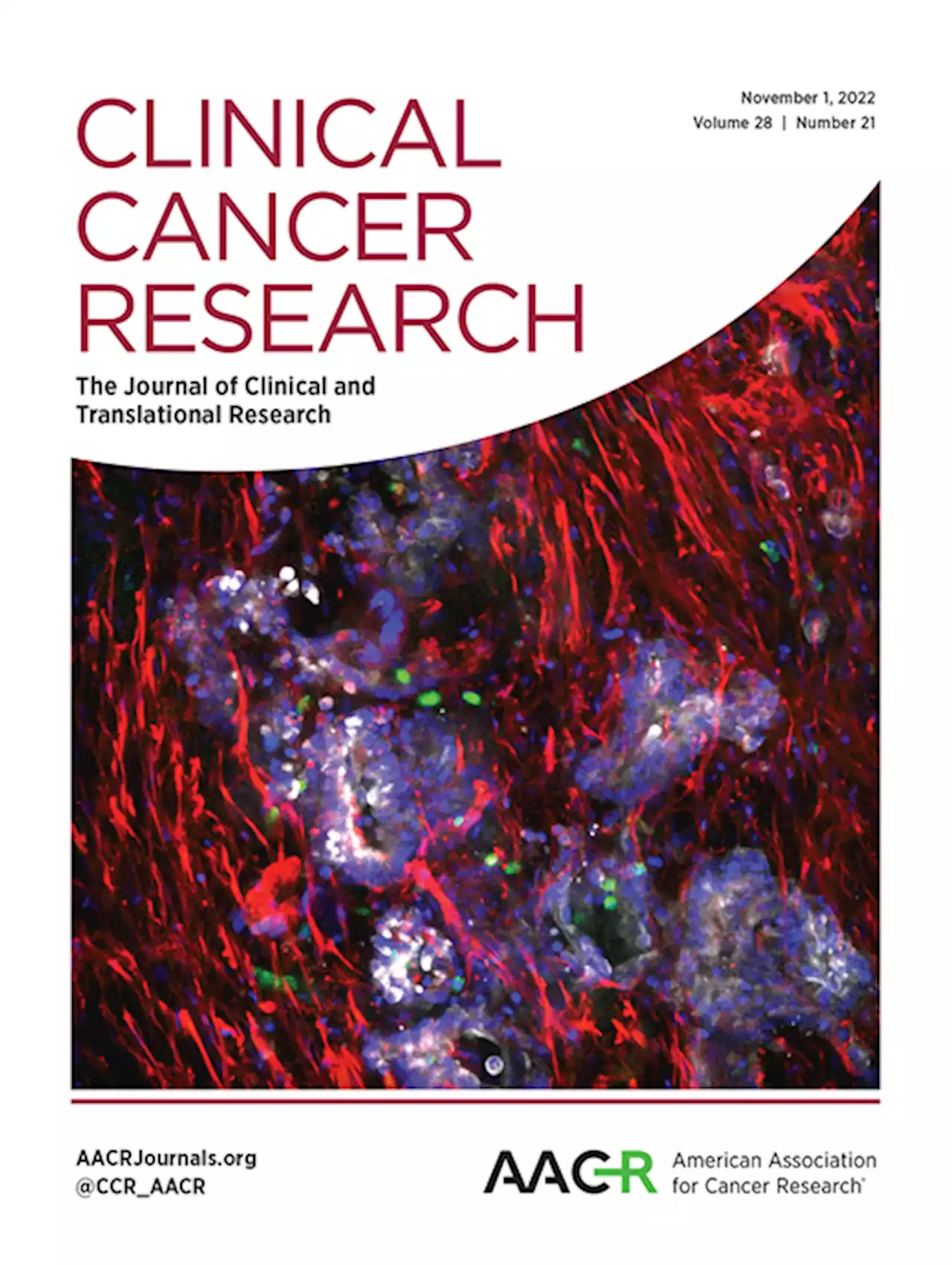Study shows promise of new anti-KRAS drug for pancreaticcancer pennmedicine NatureMedicine
Mutations in the KRAS oncogene are found in more than 90% of patients with pancreatic ductal adenocarcinoma , with Gly-to-Asp mutations being most common. Here, we tested the efficacy of a small molecule KRASG12D inhibitor, MRTX1133, in implantable and autochthonous PDAC models with an intact immune system. In vitro studies validated the specificity and potency of MRTX1133.
Concomitant with tumor cell apoptosis and proliferative arrest, drug treatment led to marked shifts in the tumor microenvironment , including changes in fibroblasts, matrix, and macrophages. T cells were necessary for MRTX1133’s full anti-tumor effect, and T cell depletion accelerated tumor regrowth after therapy.
Belgique Dernières Nouvelles, Belgique Actualités
Similar News:Vous pouvez également lire des articles d'actualité similaires à celui-ci que nous avons collectés auprès d'autres sources d'information.
 Trial shows acoziborole drug clears body of African sleeping sickness parasitesTrial shows acoziborole drug clears body of African sleeping sickness parasites Efficacy African SleepingSickness Antimicrobial Drug ClinicalTrial Trypanosomiasis TheLancetInfDis
Trial shows acoziborole drug clears body of African sleeping sickness parasitesTrial shows acoziborole drug clears body of African sleeping sickness parasites Efficacy African SleepingSickness Antimicrobial Drug ClinicalTrial Trypanosomiasis TheLancetInfDis
Lire la suite »
 Initiation of Pharmacotherapy Following CBT in Anxious Youth: Results From the Child/Adolescent Anxiety Multimodal Study (CAMS)ABSTRACT Objective: To describe youth with anxiety disorders who initiate pharmacotherapy following cognitive-behavioral therapy (CBT) in a prospective, randomized trial and to identify predictors of the decision to use pharmacotherapy. Methods: Data from CBT-treated youth (aged 7–17 years, N = 139) in the Child/Adolescent Anxiety Multimodal Study (CAMS), a multisite, randomized controlled trial that examined the efficacy of CBT, sertraline, their combination, and placebo for pediatric anxiety disorders (DSM-IV criteria), were evaluated. Initiation of pharmacotherapy following acute CBT treatment was examined over a 24-week period; the study was conducted from December 2002 through May 2007. Logistic regression models identified features associated with initiating pharmacotherapy, including symptom severity (scores on the Pediatric Anxiety Rating Scale and the Screen for Child/Adolescent Anxiety Related Disorders ), parent and child treatment expectations, Clinical Global Impressions–Improvement/Severity of Illness (CGI-I/S) scores, and clinical and demographic characteristics. Results: CBT non-remitters (CGI-S score | 2) who began pharmacotherapy (n = 10) and those who did not (n = 80) were similar in age (P = .445), sex (P = .324), race (P = .242), and symptom severity based on CGI-S (P = .753), PARS (P = .845), or SCARED (P = .678) scores. Mean ± SD improvement (CGI-I score) at week 12 did not differ between patients who initiated pharmacotherapy (3.00 ± 0.82) and those who did not (2.69 ± 0.89, P = .798). However, in the logistic regression, age (P = .003), race (P = .021), and parents’ treatment expectation (P = .037) were significantly associated with the likelihood of initiating pharmacotherapy. Beginning pharmacotherapy in CBT non-remitters was associated with a significant improvement in CGI-S score (mean ± SD decline: −0.99 ± 0.46; 95% credible interval , −0.088 to −1.89; P = .035) from week 12 to week 36 compared to patients who did not begin pharmacother
Initiation of Pharmacotherapy Following CBT in Anxious Youth: Results From the Child/Adolescent Anxiety Multimodal Study (CAMS)ABSTRACT Objective: To describe youth with anxiety disorders who initiate pharmacotherapy following cognitive-behavioral therapy (CBT) in a prospective, randomized trial and to identify predictors of the decision to use pharmacotherapy. Methods: Data from CBT-treated youth (aged 7–17 years, N = 139) in the Child/Adolescent Anxiety Multimodal Study (CAMS), a multisite, randomized controlled trial that examined the efficacy of CBT, sertraline, their combination, and placebo for pediatric anxiety disorders (DSM-IV criteria), were evaluated. Initiation of pharmacotherapy following acute CBT treatment was examined over a 24-week period; the study was conducted from December 2002 through May 2007. Logistic regression models identified features associated with initiating pharmacotherapy, including symptom severity (scores on the Pediatric Anxiety Rating Scale and the Screen for Child/Adolescent Anxiety Related Disorders ), parent and child treatment expectations, Clinical Global Impressions–Improvement/Severity of Illness (CGI-I/S) scores, and clinical and demographic characteristics. Results: CBT non-remitters (CGI-S score | 2) who began pharmacotherapy (n = 10) and those who did not (n = 80) were similar in age (P = .445), sex (P = .324), race (P = .242), and symptom severity based on CGI-S (P = .753), PARS (P = .845), or SCARED (P = .678) scores. Mean ± SD improvement (CGI-I score) at week 12 did not differ between patients who initiated pharmacotherapy (3.00 ± 0.82) and those who did not (2.69 ± 0.89, P = .798). However, in the logistic regression, age (P = .003), race (P = .021), and parents’ treatment expectation (P = .037) were significantly associated with the likelihood of initiating pharmacotherapy. Beginning pharmacotherapy in CBT non-remitters was associated with a significant improvement in CGI-S score (mean ± SD decline: −0.99 ± 0.46; 95% credible interval , −0.088 to −1.89; P = .035) from week 12 to week 36 compared to patients who did not begin pharmacother
Lire la suite »
 p53 Inhibits Bmi-1-driven Self-Renewal and Defines Salivary Gland Cancer StemnessAbstractPurpose:. Mucoepidermoid carcinoma (MEC) is a poorly understood salivary gland malignancy with limited therapeutic options. Cancer stem cells (CSC) are considered drivers of cancer progression by mediating tumor recurrence and metastasis. We have shown that clinically relevant small molecule inhibitors of MDM2–p53 interaction activate p53 signaling and reduce the fraction of CSC in MEC. Here we examined the functional role of p53 in the plasticity and self-renewal of MEC CSC.Experimental Design:. Using gene silencing and therapeutic activation of p53, we analyzed the cell-cycle profiles and apoptosis levels of CSCs in MEC cell lines (UM-HMC-1, -3A, -3B) via flow cytometry and looked at the effects on survival/self-renewal of the CSCs through sphere assays. We evaluated the effect of p53 on tumor development (N=51) and disease recurrence (N=17) using in vivo subcutaneous and orthotopic murine models of MEC. Recurrence was followed for 250 days after tumor resection.Results:. Although p53 activation does not induce MEC CSC apoptosis, it reduces stemness properties such as self-renewal by regulating Bmi-1 expression and driving CSC towards differentiation. In contrast, downregulation of p53 causes expansion of the CSC population while promoting tumor growth. Remarkably, therapeutic activation of p53 prevented CSC-mediated tumor recurrence in preclinical trials.Conclusions:. Collectively, these results demonstrate that p53 defines the stemness of MEC and suggest that therapeutic activation of p53 might have clinical utility in patients with salivary gland MEC.
p53 Inhibits Bmi-1-driven Self-Renewal and Defines Salivary Gland Cancer StemnessAbstractPurpose:. Mucoepidermoid carcinoma (MEC) is a poorly understood salivary gland malignancy with limited therapeutic options. Cancer stem cells (CSC) are considered drivers of cancer progression by mediating tumor recurrence and metastasis. We have shown that clinically relevant small molecule inhibitors of MDM2–p53 interaction activate p53 signaling and reduce the fraction of CSC in MEC. Here we examined the functional role of p53 in the plasticity and self-renewal of MEC CSC.Experimental Design:. Using gene silencing and therapeutic activation of p53, we analyzed the cell-cycle profiles and apoptosis levels of CSCs in MEC cell lines (UM-HMC-1, -3A, -3B) via flow cytometry and looked at the effects on survival/self-renewal of the CSCs through sphere assays. We evaluated the effect of p53 on tumor development (N=51) and disease recurrence (N=17) using in vivo subcutaneous and orthotopic murine models of MEC. Recurrence was followed for 250 days after tumor resection.Results:. Although p53 activation does not induce MEC CSC apoptosis, it reduces stemness properties such as self-renewal by regulating Bmi-1 expression and driving CSC towards differentiation. In contrast, downregulation of p53 causes expansion of the CSC population while promoting tumor growth. Remarkably, therapeutic activation of p53 prevented CSC-mediated tumor recurrence in preclinical trials.Conclusions:. Collectively, these results demonstrate that p53 defines the stemness of MEC and suggest that therapeutic activation of p53 might have clinical utility in patients with salivary gland MEC.
Lire la suite »
 Federated machine learning enables the largest brain tumor study to-date, without sharing patient dataResearchers at Penn Medicine and Intel Corporation led the largest-to-date global machine learning effort to securely aggregate knowledge from brain scans of 6,314 glioblastoma (GBM) patients at 71 sites around the globe and develop a model that can enhance identification and prediction of boundaries in three tumor sub-compartments, without compromising patient privacy. Their findings were published today in Nature Communications.
Federated machine learning enables the largest brain tumor study to-date, without sharing patient dataResearchers at Penn Medicine and Intel Corporation led the largest-to-date global machine learning effort to securely aggregate knowledge from brain scans of 6,314 glioblastoma (GBM) patients at 71 sites around the globe and develop a model that can enhance identification and prediction of boundaries in three tumor sub-compartments, without compromising patient privacy. Their findings were published today in Nature Communications.
Lire la suite »
 EmRata’s Latest Obsession? Knee-High Boots, Of CourseThere’s no disputing that Emily Ratajkowski has propelled herself into the ranks of a style star this year.
EmRata’s Latest Obsession? Knee-High Boots, Of CourseThere’s no disputing that Emily Ratajkowski has propelled herself into the ranks of a style star this year.
Lire la suite »
